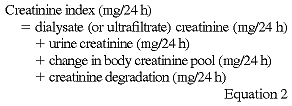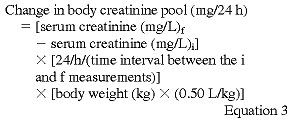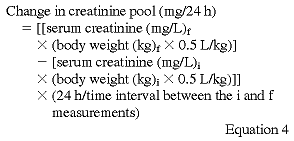
The creatinine index is defined as the creatinine synthesis rate. The creatinine index is used to assess the dietary skeletal muscle protein intake and skeletal muscle mass. The creatinine index is determined primarily by the size of the skeletal muscle mass and the quantity of skeletal (and cardiac) muscle ingested (ie, the intake of creatine and creatinine). Hence, creatinine production is approximately proportional to skeletal muscle mass in stable adults who are neither anabolic nor catabolic and who have a constant protein intake.46,102,234 In normal individuals, dietary intake of creatine and creatinine from skeletal (and cardiac) muscle is associated with increased urinary excretion of creatinine.53,229 In clinically stable individuals undergoing MD, creatinine is synthesized and levels rise in plasma at a rate that is approximately proportional to somatic protein (skeletal muscle) mass and dietary muscle (protein) intake.17,46,102 In CPD patients, the stabilized serum creatinine and creatinine index are also proportional to skeletal muscle mass and dietary muscle intake.
The creatinine index is measured as the sum of creatinine removed from the body (measured from the creatinine removed in dialysate, ultrafiltrate, and/or urine), any increase in the body creatinine pool, and the creatinine degradation rate.48
The equation for calculating the creatinine index is as follows:

The change in the body creatinine pool is calculated as follows:

where i and f are the initial and final serum creatinine measurements (usually separated by about 20 to 68 hours), body weight is the time averaged body weight between the initial and final serum creatinine measurements, and 0.50 L/kg is the estimated volume of distribution of creatinine in the body.230,231
The change in the body creatinine pool when body weight varies can be calculated from the following equation:

The creatinine degradation rate is estimated as follows:

The creatinine index can be used to estimate dietary skeletal muscle protein or mass and edema-free lean body mass.232,233 The relation between the creatinine index and edema-free lean body mass may be estimated as follows:

The constant used in this last equation (0.029 kg/mg/24 h) was derived from individuals without renal disease234 and should be reevaluated for ESRD patients; at least one study suggests that this constant is also applicable for MD patients.232 Skeletal or cardiac muscle protein intake as well as total protein intake can affect the creatinine index,235,236 and marked variations in these nutrients may therefore have major effects on the creatinine index. Thus, until the relationships between total protein intake and muscle intake and the creatinine index are well defined for ESRD patients, some caution must be exercised in interpreting the creatinine index, particularly if the diet of the individual in question is particularly high or low in these nutrients.